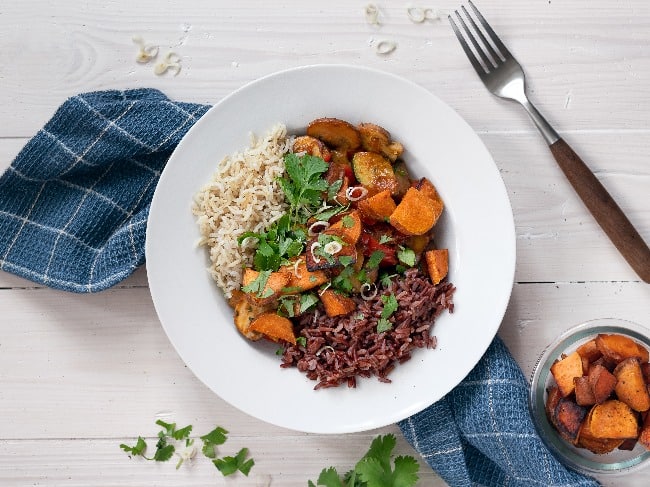 When it comes to diet, some people (not all!) can admit that what we eat affects the physical health of our bodies. But there still seem to be many more people that don’t see how our diets can possibly affect our mental health. Yet there is more and more research connecting the two. It’s a two-way street between diet and mental health and I want to show you that you may have more control over how you feel than you think!
When it comes to diet, some people (not all!) can admit that what we eat affects the physical health of our bodies. But there still seem to be many more people that don’t see how our diets can possibly affect our mental health. Yet there is more and more research connecting the two. It’s a two-way street between diet and mental health and I want to show you that you may have more control over how you feel than you think!
In a previous article, I talked about how our moods affect our food choices, mostly steering us toward unhealthy options. But now I want to talk about how the food we eat affects our mental health, and our moods, which can be either negative or positive. And we want that effect to be positive, not negative, right?!
If you can get some control over your mental health by eating a healthier diet, maybe you can avoid expensive pharmaceutical meds that may not help much anyway. Especially since they often come with some unpleasant and even unhealthy side effects.
So this article is for those of you that want a more natural alternative to feeling better mentally. I’ll share some studies showing how a change in diet can alleviate some psychological symptoms for many people. So let’s take a better look at that.
Depression
The incidence of “major depression” in the US today is about 8.4% or 21 million adults and it unfortunately affects more females. For a little perspective, the number one killer of Americans is heart disease. The rate of Coronary Artery Disease (the most common type) in the US is about 7.2%, or 20.1 million, adults over age 20.
In other words, major depression is more common than heart disease. It may seem less serious because on its own it doesn’t lead to death, but in 2020 there were 1.20 million suicide attempts in the US alone. And those rates have been rising over the past decade.
So depression definitely lowers the quality of life for an individual suffering from it. But it also lowers their ability to be productive and keeps them from being motivated to engage in healthy behaviors to improve their lives.
Related article: The many health benefits of meditation.
Foods that hurt and foods that help depression
A study of over 93,000 postmenopausal women found that those who ate higher GI (glycemic index) diets had higher BMIs (body mass index); were less physically active; had higher intakes of all fats and lower intakes of whole fruits, veggies, beans, nuts, seeds and fiber. Plus, these women were also more likely to suffer from depression. In addition:
“As the consumption of dietary added sugars increased, the likelihood of experiencing depression 3 y later increased, with the trend being significant.”
Conversely, as the consumption of dietary fibers, whole grains, fruits and veggies increased there was a decrease in depressive symptoms. So for better mental health and to lower your risk for depression, it would be wise to eat more whole, plant-based foods and back off on the simple carbs and fats. One way to do that is to cut down on processed foods. including processed meats.
There is scientific evidence that a diet high in grains, fiber and fish (the Mediterranean diet) results in less depression and anxiety but more productivity compared to animal-based diets. Nutritionfacts.org explains it even better in a short video on how plant-based diets improve mood and productivity for those of you really interested in learning more.
Related article: What does it mean to “eat healthy”?
Anxiety and stress
The most common mental health disorder in the US is anxiety, affecting about 40 million adults. And almost half of the people diagnosed with depression also have anxiety. There are many different types of anxiety disorders but fewer than half of the people who have them seek help.
When they do, medications are the most common treatment. Unfortunately, the downside of pharmaceutical treatments is that ⅓-½ of all patients “don’t achieve sustained remission from anxiety”. So what do you do about anxiety when you don’t want to take pills or you’ve tried them and they don’t work? You can start by changing your diet.
The following two sections are summarized from an article by Uma Naidoo, MD from The American Journal of Lifestyle Medicine called “Eat to Beat Stress”. The article is short, so be sure to read it for more details. She also has a book called “This is your brain on food” that has detailed information (and recipes) on what foods to eat to beat mental health disorders.
Foods that hurt anxiety
Turning to caffeine when you have anxiety can actually make matters worse, but there seems to be a specific quantity threshold. One study showed that less than 100mg of caffeine a day made little to no difference in anxiety while over 400mg showed a big increase. So if you have anxiety (or just a lot of stress), then cutting back on caffeine might help.
While alcohol seems like a good way to offset anxiety it often leads to sleep disruption. And fatigue won’t make your anxiety better! Drinking to deal specifically with social anxiety is even worse since it “quadruples the risk of developing an alcohol use disorder”. It’s better to find other ways to cope.
The added sugars that most alcoholic drinks contain have also been shown to increase anxiety (along with weight problems). And if you want to avoid sugar, you should also know that certain artificial sweeteners, like Aspartame, can increase anxiety. So read labels and know what you’re ingesting.
Foods that help anxiety
People who suffer from anxiety tend to have inflammation in the brain. Certain foods like fiber (found only in plants), can help reduce that inflammation. Omega-3 fatty acids also help reduce inflammation. You can find these in fatty fish like salmon, mackerel, sardines and tuna.
Fermented foods including plain yogurt, Kimchi, sauerkraut, tempeh and apple cider vinegar, are good for your gut microbiota and help ease anxiety. Dr. Cynthia with the Holistic Healing Heart Center tells us that there are also many different herbs and spices that help relieve anxiety. Some of them include turmeric, nutmeg, basil, lavender, lemon balm and passion flower.
I add both turmeric and basil to my homemade hummus that I eat every day at lunch with raw veggies. You don’t always have to come up with new recipes to use herbs and spices in. Just add them to your existing recipes for a little more flavor and nutritional boost!
ADHD and diet
For the many people dealing with ADHD in the US, diet has been shown to make a difference in symptoms. Deficiencies of certain nutrients can affect the ability of the brain to function at its best. It’s always a good idea to have your levels (or your child’s levels) tested so you know exactly what’s needed.
Additudemag.com points out that certain minerals can have an impact on ADHD behavior. Here’s a short list of things they say you should be aware of:
-
- Low levels of zinc are associated with inattention.
- Magnesium helps to calm the brain and body and is commonly at less than optimal levels among Americans.
- Iron is needed to make dopamine which helps with memory, attention, behavior and cognition. And iron deficiency is fairly common in the US.
- A lack of B vitamins can lead to more aggressive and anti-social behavior. B6 specifically has an effect on dopamine levels in the brain.
- Omega 3 & 6 fatty acids have been shown to reduce ADHD symptoms in children.
Dopamine is a neurotransmitter that’s known as a “feel-good hormone” and affects mood and motivation. Studies of people with ADHD have shown that they have a defective gene making it difficult for them to respond to dopamine. This puts them at a higher “risk for addictive, impulsive, and compulsive behavioral propensities”.
So, whether you have ADHD or not, it seems obvious that nutrients are an important part of helping to regulate our behavior. With that said, where do we get those important vitamins and minerals?
Related article: Are you getting enough nutrients for good health?
Which foods help with ADHD?
Zinc can be found in animal products and seafood, with oysters containing the highest amounts. Plant foods like whole grains, lentils, beans and nuts contain zinc while also having high amounts of fiber along with other nutrients that are good for mental health.
You can find magnesium in the highest amounts in foods that contain fiber, like green leafy veggies (eat a salad every day!), legumes (beans and edamame), nuts, seeds and whole grains.
Iron is in animal products and seafood, but also in veggies like sweet potatoes, peas, broccoli, and green leafy veggies.
The B vitamins, found in green leafy veggies, whole grains and animal products, have many benefits for health. For example, B12 helps with brain function and B6 helps with brain development plus strengthening the immune and nervous systems. Everydayhealth.com gives a good overview of which of these you need and why.
A Swedish study showed that children treated with Omega 3 & 6 fatty acids had at least a 25% reduction in ADHD symptoms. Omega 3 supports your heart, brain and eyes while 6 helps control cholesterol levels, regulate blood sugar and boost the immune system.
Although we need both of these fatty acids in our diets, we tend to get much more Omega 6 because it comes from vegetable oils. We get far less Omega 3 because it comes from fatty fish, seawead, nuts and seeds. You need the right balance of the two for good health which is why eating a big variety of whole foods is so important.
In short, a well-rounded diet focusing on green leafy and all other veggies, along with nuts, seeds, whole grains, fatty fish and a little meat will help the most with ADHD. Nuts and seeds, or a combination of them in a snack bar, make great treats!
What foods hurt ADHD?
This is simple:
-
- Sugar
- Artificial colors and preservatives from processed foods
Some common food allergens and gluten have also been shown to affect behavioral problems associated with ADHD. Do they have an effect on everyone with ADHD? Probably not. But to improve your quality of life, wouldn’t it be worth it to try eliminating or incorporating different foods to test them out?
My final thoughts
My point with this article is NOT to prove some direct cause-and-effect relationship between diet and mental health. We all have different bodies (and different lives) which means we have different needs. But there is enough information out there at this point to know that the foods we eat can affect our mental health. And I think the examples I’ve given above show that.
So instead of assuming you’re stuck with the intensity of your mental health problems, choose to empower yourselves with better diets and a healthier lifestyle. The simplest solution for better overall health is to nourish your body with the best available food so it can function as it should. If it doesn’t solve or at least diminish your problems, then you can turn to other means of help.
But you should also realize that small changes don’t usually make a big difference. Big changes do! So experiment with your diet, pay close attention to how you feel and give it some time.
Generally, when you’re put on a pharmaceutical medication, you’re on it for life (and the medical industry loves that you’re dependent on them!). But drugs just don’t fix the problem permanently. When you feed your body the healthiest diet possible, you give your immune system (and all the other systems of your body) the resources it needs to heal itself for good.

